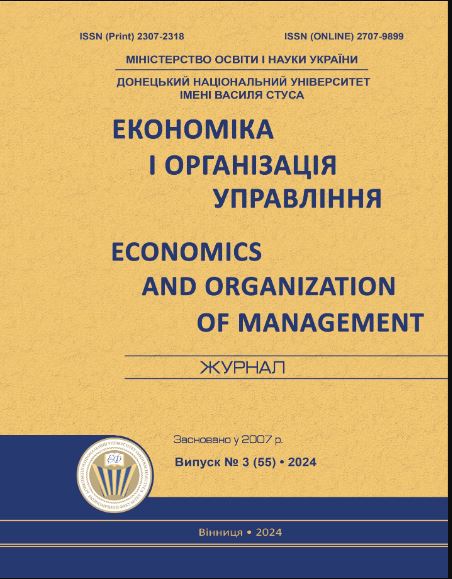Cooperation or autonomy: choosing a strategy to ensure the stability of global supply chains through protectionism after the COVID-19 pandemic
DOI:
https://doi.org/10.31558/2307-2318.2024.3.4Keywords:
strategies, economic stability, global supply chains, post-pandemic period, protectionismAbstract
In the context of the COVID-19 pandemic, countries have faced the need to ensure stability in global supply chains. Post-pandemic, many countries are considering cooperation with international partners as a strategic approach to ensuring the stability of global supply chains. Joint agreements and international partnerships can reduce risks and dependence on a single supplier or region, promoting an even distribution of risks. On the other hand, some countries prefer autonomy, positioning themselves against the global market and creating internal reserves and production bases. This may involve producing key products domestically or entering into strategic agreements with other countries to ensure independence.
Despite the advantages of both approaches, protectionism can be a double-edged sword. While it may ensure domestic supply chain stability, it can also lead to trade conflicts and corresponding reactions from partners.
The article examines the impact of the COVID-19 pandemic on global supply chains and analyzes two main strategies and their symbiosis that countries use to overcome vulnerabilities in these chains, with a focus on the influence of protectionist policies. Various aspects of protectionism, such as the implementation of tariffs, protection of the domestic market, and joint trade agreements, are analyzed to determine their impact on global supply chains and their resilience.
References
Gereffi G. What Does the COVID-19 Pandemic Teach Us about Global Value Chains / Gereffi. // The World Economy. – 2020. – №43. – P. 1957–1978.
Ivanov D. Viability of intertwined supply networks: extending the supply chain resilience angles towards survivability. A position paper motivated by COVID-19 outbreak / D. Ivanov, A. Dolgui // International Journal of Production Research. – 2020. – № 58 – Р. 1-12.
Chopra S. Redesigning supply chains after COVID-19. / S. Chopra, M. S. Sodhi. // International Journal of Operations & Production Management. – 2020. – №41. – P. 1–18.
Evenett S. J. What’s next for protectionism? Watch out for state largesse, especially export incentives / Evenett // COVID-19 and Trade Policy: Why Turning Inward Won’t Work / Evenett. – London: CEPR Press., 2020. – P. 179–187.
Baldwin R. Thinking Ahead about the Trade Impact of COVID-19 / R. Baldwin, E. Tomiura. // Economics in the Time of COVID-19. – 2020. – P. 59–67.
Smith J. Balancing Protectionism and International Cooperation: Strategies for Supply Chain Resilience. / J. Smith, R. Brown. // Journal of Global Business Studies. – 2020. – №12. – P. 105–120.
Smith J. Impact of COVID-19 on Global Supply Chains: Challenges and Adaptations. / Smith. // Journal of Supply Chain Management. – 2021. – №25. – P. 45–60.
Smith J. Balancing Protectionism and International Cooperation: Strategies for Supply Chain Resilience. / J. Smith, R. Brown. // Journal of Global Business Studies. – 2020. – №12. – P. 105–120.
Lee S. Protecting Domestic Industries through International Partnerships: A Case Study of South Korea's Trade Policy. / S. Lee, D. Kim. // Journal of International Economics. – 2021. – №28. – P. 45–62.
Why pandemic-induced trade protectionism will affect tax for years [Electronic resource] // Ernst & Young Global Ltd.. – 2021. – Mode of access: https://www.ey.com/en_au/tax/why-pandemic-induced-trade-protectionism-will-affect-tax-for-years.
Wang F. The Impacts of COVID-19 on China’s Economy and Energy in the Context of Trade Protectionism. / F. Wang, M. Wu. // International Journal of Environmental Research and Public Health. – 2021. – №18. – P. 1–23.
Quirk J. Covid-19 and Export Restrictions: the Case for Free Trade / Quirk. // Loyola University Chicago International Law Review. – 2021. – №4. – P. 151–166.

